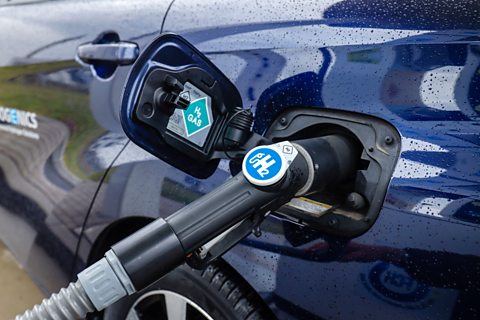Key facts
Solar power comes from the Sun so it is a renewable energy source.
We can use the energy from the sun to provide heat directly. We can also use solar panels made up of solar cells to turn sunlight into sustainable electricity.
Solar panels are highly efficient in Scotland. 35, 000 homes have already transitioned to solar energy and feeding electricity into the National GridThe name given to the network of pylons and power lines that transport electricity to our homes, schools, offices and businesses..
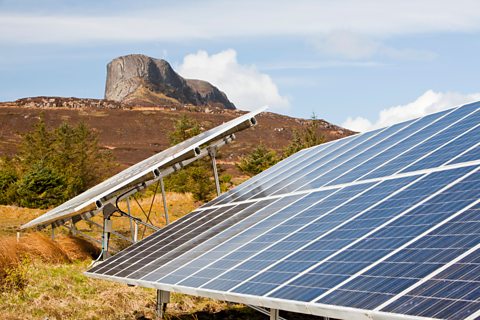
Solar power and its impact
Find out how the sun can be used to generate electricity.
Life on Earth depends on the Sun. Plants convert the Sun’s light energy into chemical energy that lets them grow and survive – and then we eat those plants to get energy from our food.
And we can use energy from the Sun in other ways. Solar power transforms light energy from the Sun into electrical energy. It does this using solar cells. You can find solar cells in all sorts of places from calculators to road signs, the roofs of houses to up in space powering satellites.
George Loumakis, Energy lecturer, Glasgow Caledonian University: There are many ways we can harness solar energy. The two main ones we use is by using it to get electricity and by using it to get heat.
We get electricity through small devices called photovoltaics – solar panels – I actually have one here in front of me. Very small, as so on. And we can get heat from them by using solar thermal panels which are very similar in appearance but their job is to create heat rather than electricity.
Solar cells – or photovoltaic cells – contain layers of materials called semiconductors that have been sandwiched together. When sunlight hits these semiconductors the energy builds up electrical charges between the different layers and this creates electricity.
Solar cells are grouped together in panels. Lots of panels together are called an array, and the more arrays you have the more electricity you can generate. Some solar arrays are enormous. The Noor Power Station covers six thousand acres of the Sahara desert. It can provide enough energy for up to one million people. While it is estimated to reduce carbon emissions by seven hundred and sixty thousand tonnes annually.
So, solar energy is renewable, sustainable, and, once installed, produces cheap electricity – but not all the time. Solar power only works when the sun is strong enough. It doesn’t work if it is too cloudy or when it is night. So, in Scotland it works much better in summer than in winter.
Scotland’s climate means our renewable energy is more reliably generated through wind and hydro power. Solar is only used on a smaller scale here. Once solar panels are installed, they don’t cause any pollution but there is an environmental cost from mining the rare metals required to make them. And if demand continues, the supply of these metals might run out.
Despite these problems, Scotland is using much more solar power than it used to with thirty-five thousand homes now fitted with solar panels and feeding electricity into the National Grid.
Can solar power still be a useful part of our energy network?
How solar energy is used
Solar electricity panels
Electricity is generated from energy from the Sun by solar panels. These are made up from individual solar cells (also called photovoltaic cells).
- Light from the sun passes through the glass cover of a solar cell.
- The sunlight hits layers of semiconductors, giving extra energy to electrons in the semiconductors.
- This energy builds up negative and positive charges in the different layers.
- The opposite charges cause an electrical current to flow through metal wires.
- This electricity can then be used locally or transported through the National Grid to homes and workplaces.
Solar thermal panels
As well as being used to generate electricity, solar energy can be used to directly provide heat to our homes. One common usage is to provide hot water rather than relying on a gas-powered boiler.
Solar thermal panels absorb energy from the sun. This heats up a fluid that is piped through them. The fluid then transports this heat to a water tank.
Location factors
- Solar energy is energy that comes from the Sun and the solar panels use sunlight to make electricity.
- Therefore, locations with direct access to sunlight are needed.
- South facing areas receive more sunlight than north facing so these are good sites.
- Solar panels do not work when in shadow. Obstructions like trees, buildings or even the chimney on a roof can prevent them from working.
- Areas with many days of sunlight hour* over the course of the year are ideal.
- In Scotland, some of the sunniest locations are near or on the east coast as well islands including Tiree.
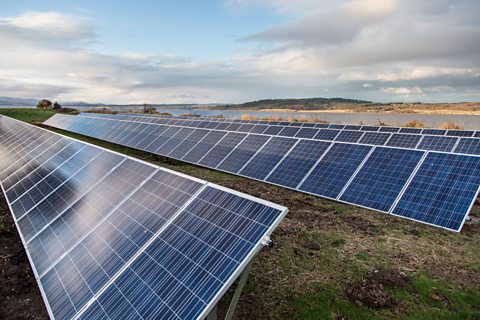
Sustainability of solar power
To develop a sustainable future you need to think about meeting today's needs and protecting the environment and resources for the future.
Solar energy is a renewable source. As long as the Sun lights the Earth, we will always have solar energy…
Solar power is sustainable because it releases no greenhouse gases or pollution,
The negative impact of solar power is down to the impact of their manufacture and transport. Large amounts of energy and water are needed to manufacture solar cells and the chemicals used can cause pollution.
Solar cells include rare metals and extracting these causes damage to local environments.
Most modern solar panels are expected to last about 40 - 50 years. Recycling them will help make them more sustainable.
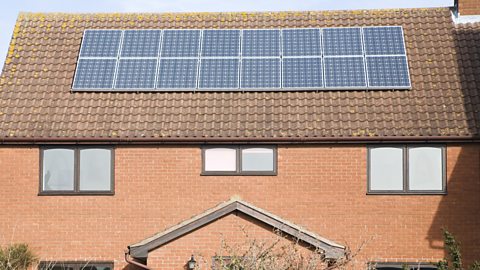
Advantages and disadvantages of solar power
Advantages
- One of the biggest benefits of solar energy is that it is renewable. It needs no extra fuel other than the light from the sun.
- Solar panels are very versatile in their variety of sizes and uses. If you are installing them, the trick is to find the best location. You can use a light sensor to find out which spots get the best amount of light.
- There are no fuel costs and no harmful polluting gases are produced.
- Solar cells can provide electricity in remote locations where there is no mains electricity.
- Solar thermal panels can be used to heat spaces and water directly.
Disadvantages
- Due to our seasonal sunshine, solar power generates more electricity in summer with longer periods of daylight but long winters and cloudy skies reduce its efficiency.
- Scotland’s variable sunshine means our renewable energy is more reliably generated through wind and hydroelectric power.
- Solar panels don't work at night. This is often when people are using the most energy in their homes.
- Solar panels cannot store energy, so batteries or capacitors are needed to do this.
- Making solar cells requires rare metals as well as lots of energy and water.
Test your knowledge
More on Energy sources and sustainability
Find out more by working through a topic
- count9 of 12
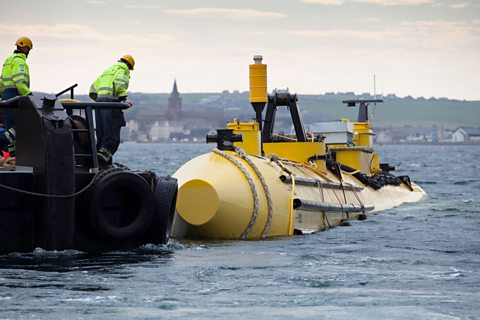
- count10 of 12
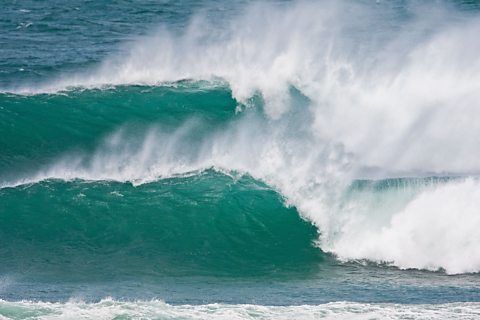
- count11 of 12
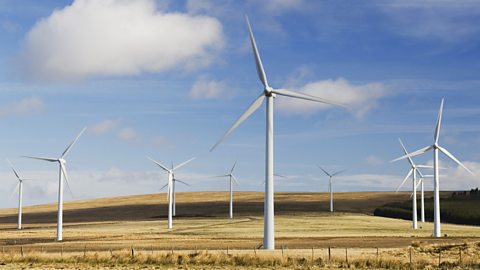
- count12 of 12
